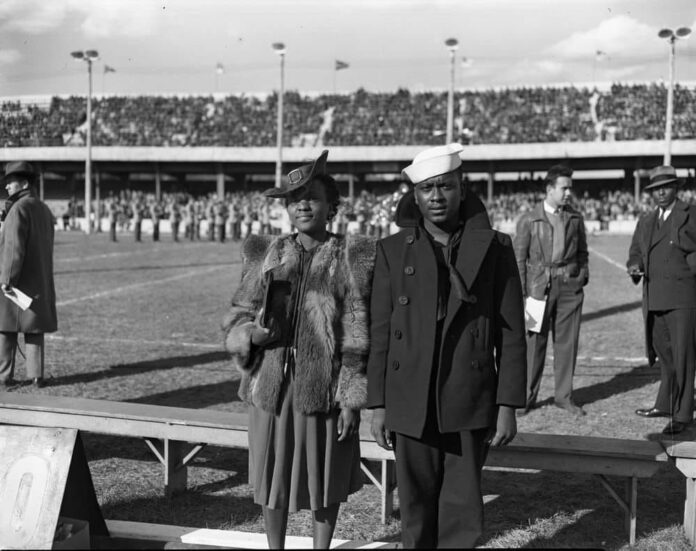
By Stacy M. Brown, NNPA Newswire Senior National Correspondent
It remains by far one of the most heroic acts performed in war, and it also counts as one of the most underappreciated sacrifices in American history.
Charles Jackson French, an African American orphan, and championship-caliber swimmer navigated shark infested waters for about eight hours during World War II on a frigid September 1942 night to pull to safety a raft of 15 sailors.
A United States Navy Messman, French courageously acted after the Japanese navy struck a U.S. ship in the South Pacific during the conflict.
Dozens of Americans were killed, and many others wounded, included French.
It didn’t stop the Foreman, Arkansas native and avid swimmer since the age of eight, from tying a rope around his waist, jumping into the waters, and defying the multitude of sharks that hungrily searched for prey.
His mission was to rescue fellow soldiers.
Despite his heroism, the ignorantly prejudiced United States all but ignored French.
The nation’s hierarchy denied French the Medal of Honor and did not consider him for a Silver Star, two of the highest honors bestowed for such self-sacrificing bravery.
As noted at history.com, the 1.2 million African Americans who served in World War II fought for democracy overseas while being treated as second-class citizens by their own country.
“Despite African American soldiers’ eagerness to fight in World War II, the same Jim Crow discrimination in society was practiced in every branch of the armed forces,” historians at history.com wrote.
“Many of the bases and training facilities were located in the South, in addition to the largest military installation for Black soldiers, Fort Huachuca, located in Arizona. Regardless of the region, at all the bases there were separate blood banks, hospitals or wards, medical staff, barracks and recreational facilities for Black soldiers. And white soldiers and local white residents routinely slurred and harassed them.”
Perhaps out of fear of global embarrassment, Adm. William F. Halsey, Jr., sent French a letter of commendation.
The letter read, in part, “For meritorious conduct in action while serving on board of a destroyer transport which was badly damaged during the engagement with Japanese forces in the British Solomon Islands on Sept. 5, 1942.
“After the engagement, a group of about fifteen men were adrift on a raft, which was being deliberately shelled by Japanese naval forces. French tied a line to himself and swam for more than two hours without rest, thus attempting to tow the raft. His conduct was in keeping with the highest traditions of the Naval Service.”
Many at home believed French should have received more.
“[The] episode was complicated by the issuance of a posthumous Silver Star to Lt. Cdr.H. F. Baurer, the ship’s CO. Wounded and dying, the skipper ordered two companions to leave him and go to the aid of another crewman who was yelling for help,” historians wrote.
“He was never seen again. By Navy standards, it would be nearly unprecedented for a subordinate to receive a higher decoration for an act of heroism comparable to that of a superior.”
French was memorialized on War Gum trading cards, in syndicated comic strips, on calendars, and The Chicago Defender named him Hero of the Year.
Born Sept. 25, 1919, French died on Nov. 7, 1956, at 37.



